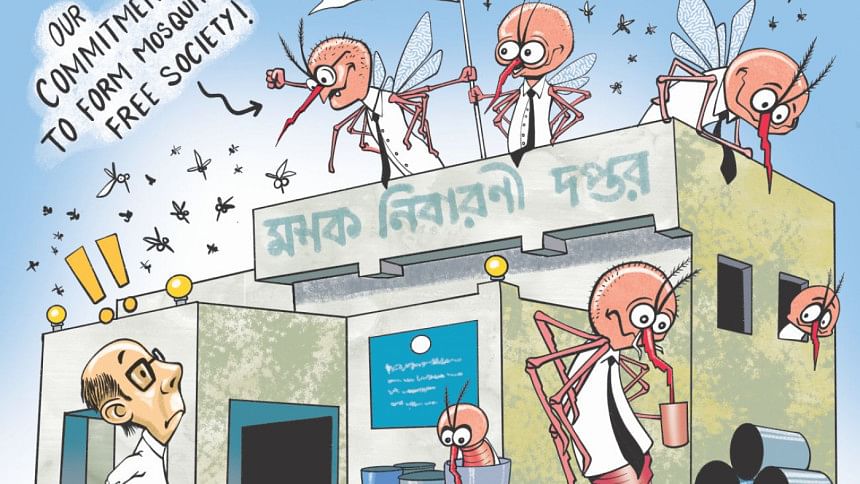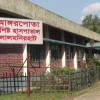Mosquito Control Dept: IN ABSOLUTE SHAMBLES

In Dhakeshwari area in the old part of the city, a signboard reading “Moshok Nibaroni Daptor” stands out, especially for citizens tired of the mosquito menace that shows no signs of ending.
This is Dhaka’s Mosquito Control Department, which was established back in 1948 to eradicate the insects.
Entering the building, one will be struck by a blatant irony: the entire compound itself serves up the perfect environment for mosquitoes to breed in.
There are around half a thousand empty insecticide drums hugging the sides of the premises. The two-storey building has 17 rooms, some of which remain locked.
A quiet atmosphere prevails in and around the building due to a lack of activities.
“Dhaka Mosquito Control Scheme was established in order to eradicate malaria at that time. It was vibrant with a strong workforce [back then] and played an effective role in eradicating mosquitoes since its inception,” said Giasuddin, storekeeper of the department.
Some 338 contingency workers, appointed under the mosquito control scheme, were regularised under the ministry of health in 1972, he said. Back then, extensive work, including conducting drive against mosquito, its larva and breeding grounds, along with research work relating to mosquito control activities in Dhaka, were carried out.
However, once the department was brought under the Local Government, Rural Development and Cooperatives (LGRD) in 1981-1982 and subsequently under the direct preview of Dhaka City Corporation (DCC), it lost the essence it was empowered for.
“We are the department to battle mosquito, but we have no power now. We just distribute insecticides [both larvicide and adulticide] to all the zones under Dhaka South City Corporation and Dhaka North City Corporation on their instructions.
“Now we have 281 staffers; only 13 of them do official work and the rest 269 do field work under the supervision of the two city corporations,” he said, adding that their office premises were now being used as a warehouse of insecticide drums, although they did not have any authority to purchase those.
PHASED OUT?
Workers at the office get their salaries under the LGRD ministry.
However, in July of last year, they refused to draw salaries under grant assistance head, which they claim did not fall under the Integrated Budget and Accounting System ++, a software through which the government disbursed salaries to its employees.
“We were offered to take salaries under grant assistance but we refused as we will not get any facilities like a government employee under the separate code,” Nurul Haque, supervisor of the department, said at the time.
Afterwards, ANH Faizul Haque, deputy secretary of Local Government Division (LGD), who is now discharging duties as assistant director of the department as an additional charge, said the matter of salary was soon resolved but the ineffectiveness of the office, owing to its very limited sphere of influence, remains.
Wishing not to named, an LGRD official said the government should strengthen the activities of the department of mosquito control, increase its staff and give it full authority or incorporate it under the two city corporations so that they could work as city corporation staffers.
Asked about plans for the department, another top official of the LGRD said they were working on it and would take a decision shortly.
Entomologist Professor Kabirul Bashar of Jahangirnagar University also advocated for bringing the department under the two city corporations.
He said it should have been a strong section of the two corporations instead of being a part of the health department.
Health officer of Dhaka South City Corporation Mir Mustafizur Rahman said they also felt that a separate wing in the DSCC -- for different tasks such as research work regarding controlling mosquito -- should be created.

 For all latest news, follow The Daily Star's Google News channel.
For all latest news, follow The Daily Star's Google News channel. 








Comments